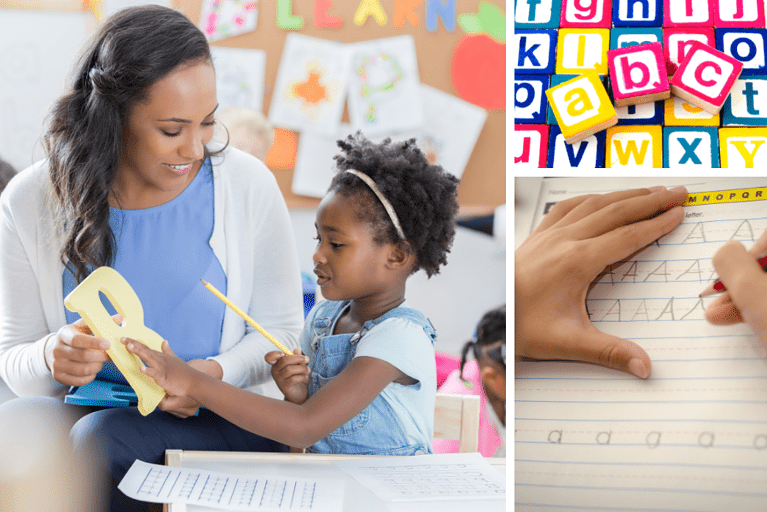Let’s talk about things that struggling readers need.
When you notice that your child is starting to struggle with reading, it can be an emotional and overwhelming realization. It’s never easy to see our children struggle. Reading struggles specifically can be a source of frustration for everyone involved.

Are you ready for the good news? You can help!
With the right support and instruction, you can see progress in your child’s reading abilities. They can become successful and confident readers!
In this post, we will discuss 7 things that struggling readers need. Whether you are a parent of a struggling reader or a teacher, this article is filled with information that will help your struggling readers get back on track.
What Do Struggling Readers Need?
- Phonics Instruction
- Phonemic Awareness Activities
- Decodable Books
- Vocabulary Building
- Practice and Opportunity
- Dictation
- Supportive Environment
Struggling Readers Need… Phonics Instruction

Let’s talk about the importance of phonics instruction. Phonics is the connection between sounds and letters. It is how letters are related to sounds. When we read words, we are blending together those different sounds. Phonics instruction directly teaches children the different ways sounds and letters are connected.
Phonics is an important part of reading development. If your child is having trouble with sounding out words, they may need more instruction in phonics.
Teaching your child phonics can really be a game-changer if your child is struggling. Not only does it help them develop the skills to read words, but it will also increase reading fluency (your ability to read a text easily and quickly).
Interested in learning more about phonics? This article from Scholastic has great pointers to check out!
Struggling Readers Need… Phonemic Awareness Activities

Phonemic awareness is the ability to hear, recognize, and play with sounds. Those sounds that you hear are called phonemes. This is a really important skill for learning to read and spell. This is especially true for children who are having trouble with reading.
You can build this skill through many different interactive activities. These can include:
- Rhyming games – Tell your child a word and have them provide a rhyming word. Make it extra silly and have them provide a made-up (nonsense) word!
- Sound-matching games – Have your child match spoken sounds to written letters.
- Check out some of these resources to work on this skill.
- Blending and segmenting exercises – Have your child blend sounds to form a word or break up a word into the individual sounds.
Keep these activities fun and light. You can do some of these types of activities anywhere!
If you are looking for a more specific curriculum to incorporate, I highly recommend Heggerty. Check out their YouTube channel for demonstrations on how to teach certain skills. It’s been so helpful to me!
Struggling Readers Need… Decodable Books

I could write a love song about decodable books… They are that great!
Decodable books are books that specifically match the spelling patterns that they have learned so far. So, if your child has been working on short vowel sounds, a good decodable book choice will include plenty of short vowel sound words. Spelling patterns that are more complicated than short vowel sounds (words like farm, boat, etc.) will not be in a decodable book like this.
As your child is reading these books, they will come across words that they can sound out. This is because they learned about that spelling pattern before! Decodable books give your child the opportunity to practice those new skills in context. The result is a more confident and skilled reader.
DECODABLE BOOKS
Struggling Readers Need… Vocabulary Building

Vocabulary is simply the words that your child understands. Building a strong vocabulary is important for reading success. It is especially important for struggling readers.
When you work on vocabulary building together, your child will increase their understanding of words. In turn, this will improve their reading comprehension! They will better understand what they are reading.
Here are some fun ways to build your child’s vocabulary.
- Word study, where children learn about the meaning and usage of new words
- Word maps, where children create graphic representations of new words and their meanings
- Word games, such as crossword puzzles and word bingo, that provide opportunities to practice new words in a fun and engaging way
When selecting vocabulary building activities, select activities that are at your child’s level and also match their personal interests. The most important thing is that they should be enjoyable and give your child plenty of chances to practice and remember new words.
Struggling Readers Need… Practice and Opportunity

Practice and opportunity will be key when it comes to seeing reading improvement in your child.
Reading is a complex skill! Repeated practice is needed to develop and refine all of those skills.
There are so many ways to provide opportunities for practice, including:
- Independent reading – Let your child choose a book and have them read on their own.
- Reading a book together
It is important to provide positive feedback and support to your child during this. There may be some resistance at first, but reading will soon become a thing they enjoy with your help and support.
Struggling Readers Need… Dictation

This seems a little old school, but it’s such a great tool for our growing readers! Dictation is when you listen to a word or sentence. You then write down what was heard.
Dictating words and sentences can be a great tool because it gives our children the opportunity to reinforce their reading and writing skills. During dictation, you will be able to see what exactly your child may need in future lessons. You’re able to see that your child is really mastering this specific skill, but they may need some extra practice in a different skill.
Let’s go over some ways to make dictation an enjoyable part of your day.
- Play teacher! Take turns dictating words and sentences with your child. Keep score and declare a winner at the end.
- Dictate a story together. Take turns dictating a story together. Each person will add a sentence to the story. The result is a funny story!
- Create or rehearse a favorite song together. You can either make up a new song or write down the lyrics of a favorite song! Spelling patterns will likely be complicated so this would be better suited as a way to model spelling and writing.
- Take it outside! When the weather permits, grab some chalk and take your dictation practice to the sidewalks.
Struggling Readers Need… A Supportive Environment

I saved the best for last. Okay, maybe not the best, but definitely the most important. To help your little reader, the most important thing you can do is create a supportive environment.
A supportive environment is somewhere where your child feels valued, respected, and ultimately encouraged to take chances while learning with minimal judgment.
Here are some ways to make sure your home is a supportive environment:
- Encourage risk-taking. Your children will feel comfortable trying new things and making mistakes
- Provide opportunities to read and write together
- Foster a love of reading, so that children see reading as enjoyable and important
Looking for ways to make your home a literacy-rich environment? Check out my post here.







